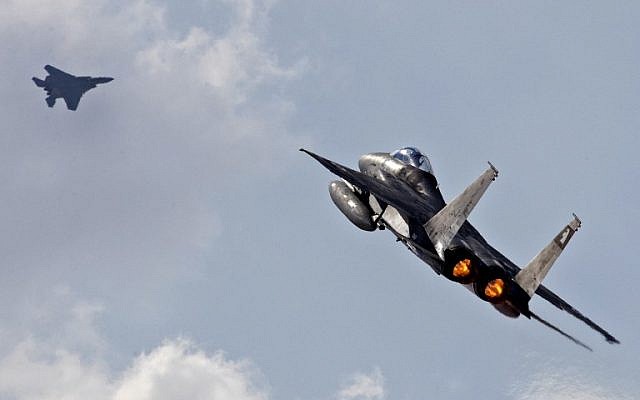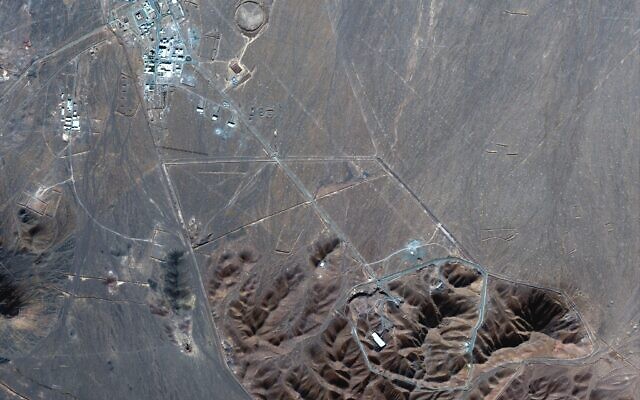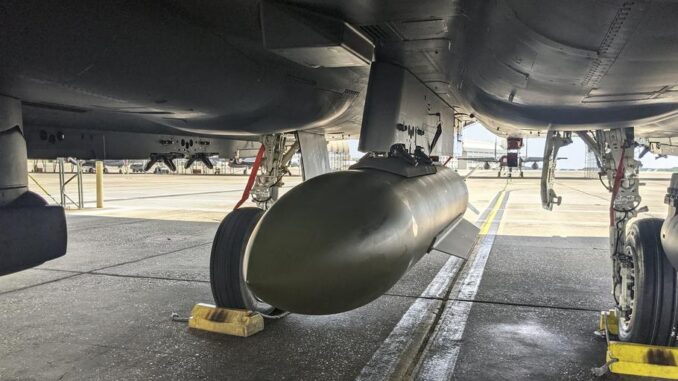Sum said to include funds for aircraft, intel-gathering drones and unique armaments needed for attack; report comes days after US announces successful test of new bunker buster
TOI STAFF, 19 Oct 2021,
 An Israeli Air Force F-15 takes off during the Blue Flag air exercise at the Ovda air force base, north of the Israeli city of Eilat, on November 8, 2017. (Jack Guez/AFP)
An Israeli Air Force F-15 takes off during the Blue Flag air exercise at the Ovda air force base, north of the Israeli city of Eilat, on November 8, 2017. (Jack Guez/AFP)
Israel has approved a budget of some 5 billion shekels ($1.5 billion) to be used to prepare the military for a potential strike against Iran’s nuclear program, Channel 12 reported Monday.
The NIS 5 billion budget is made up of NIS 3 billion from the previous budget and an additional NIS 2 billion from the next budget slated to be approved by the government in November,
It includes funds for various types of aircraft, intelligence-gathering drones and unique armaments needed for such an attack, which would have to target heavily fortified underground sites, the unsourced report said.
The report comes days after the US Air Force announced that it had carried out a successful test of its new “bunker buster,” the GBU-72 Advanced 5K Penetrator. The 5,000-pound bomb could be used as a tool to strike Iranian nuclear sites.
Crucially, the GBU-72 is designed to be carried by a fighter jet or a heavy bomber. Israel does not have bombers capable of carrying the massive bunker busters in the current US arsenal.
A smaller bunker buster bomb, the GBU-28, was secretly sold to Israel in 2009, though it is not thought to have the ability to penetrate Iran’s Fordo nuclear facility, which is buried deep under a mountain.
<
>
The American test was based on experience gained by Israel in its bombing of Hamas’s underground tunnel network in Gaza during last May’s war, Channel 12 said.
The network speculated that in publicizing its 35,000 foot-drop of the bunker-buster at Florida’s Eglin Air Force Base, the US is seeking to warn Iran not to stay away from negotiations at Vienna aimed at reviving the nuclear deal, known as the Joint Comprehensive Plan of Action.
Iran walked away from indirect talks with the US last June and elected as president ultraconservative hardliner Ebrahim Raisi, who has spoken out against the JCPOA, in the interim.
IDF Chief of Staff Lt. Gen. Aviv Kohavi during a graduation ceremony at the National Security College in Glilot, central Israel, on July 14, 2021. (Tomer Neuberg/Flash90)
Last month, IDF Chief of Staff Aviv Kohavi told the Walla news site that Israel has “greatly accelerated” preparations for action against Iran’s nuclear program.
Kohavi said that “a significant chunk of the boost to the defense budget, as was recently agreed, was intended for this purpose. It’s a very complicated job, with much more intelligence, much more operational capabilities, much more armaments. We’re working on all these things.”
Kohavi had publicly declared in January that the IDF was preparing fresh “operational plans” for a potent military strike, and in August that Iran’s nuclear progress has prompted the IDF “to speed up its operational plans,” with a fresh budget to do so.
In his speech to the UN General Assembly last month, Prime Minister Naftali Bennett declared that “Iran’s nuclear program has hit a watershed moment, and so has our tolerance. Words do not stop centrifuges from spinning… We will not allow Iran to acquire a nuclear weapon.”

This Nov. 4, 2020, satellite photo by Maxar Technologies shows Iran’s Fordo nuclear site (Maxar Technologies via AP)<
The Biden administration says it is still seeking a joint US-Iranian return to compliance with the JCPOA, while acknowledging that it will not wait indefinitely for Tehran to return to the negotiation table.
If it fails to do so, US Secretary of State Antony Blinken told his Israeli counterpart Yair Lapid that “every option” will be on the table — an apparent uptick in rhetoric after US President Joe Biden told Bennett in August that Washington was willing to consider “other options” if the JCPOA cannot be revived.
Air Force drops new 5,000-pound bunker-buster bomb for first time
WYATT OLSON, • STARS AND STRIPES • OCTOBER 13, 2021

The 40th Flight Test Squadron at Eglin Air Force Base, Fla., prepares to release a GBU-72 Advanced 5K Penetrator bomb for the first time, Oct. 7, 2021. (Samuel King/U.S. Air Force)
The Air Force is testing a mammoth, 5,000-pound bomb designed using advanced modeling to increase its impact in reaching and destroying hardened underground facilities the likes of North Korea’s ballistic-missile and nuclear-weapons facilities.
An F-15E strike fighter completed a series of three tests Thursday with the GBU-72 Advanced 5K Penetrator dropped at 35,000 feet over the range at Eglin Air Force Base, Fla., the Air Force said in a news release Tuesday.
The series, planned by the 780th Test Squadron and performed by the 40th Flight Test Squadron, began on July 23 and marked the first time the 2.5-ton bomb was loaded, flown and released, the Air Force said.
The tests successfully showed that the weapon could be safely released from the jet that had been modified from its usual capability of carrying a 2,000-pound bomb to one that weighs 5,000 pounds, the Air Force said.
The GBU-72 was also tested during a series of detonations on the ground at Eglin, the largest such “open-air” test ever held at the base’s range, the Air Force said.
The warhead was surrounded by blast pressure sensors and equipment used to count fragments, measurements designed to determine the bomb’s lethality, the Air Force said.
An F-15E Strike Eagle from the 40th Flight Test Squadron drops a GBU-72 Advanced 5K Penetrator bomb over the range at Eglin Air Force Base, Fla., Oct. 7, 2021. (Samuel King/U.S. Air Force)
The GBU-72 was developed using advanced modeling and simulation techniques that substantially increase its lethality compared to the GBU-28, a decades-old 5,000-pound bunker-buster bomb, the Air Force said.
The GBU-28 was first used in Iraq during Operation Desert Storm in 1991 and again during the U.S. invasion of Iraq in 2003.
The GBU-72 and 28 are dwarfed by the Air Force’s 30,000-pound GBU-57 Massive Ordnance Penetrator bunker buster, which can only be carried by advanced bombers.
One of the advantages to the modeling and simulation process used in designing the GBU-72 is that the early prototype represents what the actual hardware and software would be when it is mass produced for the field, James Culliton, program manager for the GBU-72, said in the release. “This helps us bring our operational test partners in sooner with eyes on, hands on participation, validating our design and procedures sooner while including input that improves the weapon.”
The GBU-72 is slated to begin operational testing next year, the Air Force said.




Fairly stated, Bear. Time will tell.
@Peloni, I do not know if Israel will act or not against Iran. Only those in a very small inner circle do. As I have known over the years those who have acted against our enemies, my comment is we will know when we know.
Perhaps the only positive thing Ichud Olmert authorized as PM was the destruction of the Syrian nuclear reactor. This was done by a man who has no moral principles and was willing to give most of Judea/Samaria to our Pal-Arab enemies.
Why did he do this because he believed Israel would be imperiled by the Syrians having the capability to create a nuclear weapon. Israel would be in serious danger if Iran obtains nuclear weapons by their own hands or by purchase from North Korea.
So, I personally refrain on making too many prejudgments on actions or no actions because of a lack of the information of specific detailed subject matter. There could plans unfolding as I type or not.
I haven’t been following this closely but at first glance it seems that if Israel is serious about this, it must be suicidal, and if not, Israel must be playing some sort of a political game – like trying to get more military aid or something, or showing its undying loyalty to its colonial master.
@Bear
So, disinformation is it? Perhaps. I see things differently, though, even as I might be absorbing too much disinformation to make my thoughts relavent.
It is slightly over 11 weeks past Gantz’s 10 week warning on Iran’s nuclear ability, for those who have not become so disinterested with the repeated threats of action and lack of followup that such threats lose their use, especially in disinformation campaigns as you suggest might now being waged. Gantz’s words “Now is the time for deeds – words are not enough,” would seem to leave little ambiguity. More than 11 weeks have now passed and the clock has been reset it seems, even as it seems the time for words have returned, describing future budgets, future planes and future bombs which will require future training and further significant delays.
Perhaps it is meant to distract the attention from the fact that nothing happened when the clock struck twelve, so to speak, as suggested by the indomitable Gantz.
I don’t mean to be too harsh, and don’t desire rash action either, as nothing could be more disastrous. However, it was Gantz’s rash decision to publicly note a certain timeline when the resolve to act was, apparently, not certain.
None of us can know with absolute conviction what the future will hold. Nor can we be certain of the true purpose behind such public bungles as the 10 week warning that ended in an attack of further rhetoric. Perhaps it was intended to both make Gantz look foolish as well as to make further threats to appear toothless, and if this was their goal, well it likely worked.
Personally, I am uncertain that the resolve exists to attack the Iranians without the authorization of the American regime which is protecting it. I am convinced the Americans have no interest in stopping Iran from gaining nuclear capabilities, quite the contrary. I also have concerns of the close relationship between the Left dominated govt in Jerusalem and the Radical regime in Washington, a relationship that will not easily endure such a stark policy divide as should be pursued by the Lapid/Bennett govt, if they are to pursue the interests of their own nation.
Note that Washington chose to lift sanctions on Iranian missile production companies just 4 days after Gantz’s comment. This was just 2 wks prior to Bennett’s ‘successful’ Washington Summit where it was determined by the Washington Radicals that ‘diplomatic negotiations’ would be pursued, even as the Iranians are not negotiating.
It seems clear to me, for what it is worth, that the govt of Israel must come to a certain judgement that to attack Iran will create a breech with their Radical allies in Washington. I am not convinced that they have either the ability or the resolve to do so. These recent comments about future budgets funding future armaments which will require future training and further delays all stand very solidly to paint a picture of support of the views that there will be no action any time soon, all coming so soon after the 10 week deadline fizzle and the Washington Summit knockout. So perhaps it is all a disinformation campaign being pursued. Whether you believe the Lapid/Bennett govt will authorize an attack which will undermine the intents of the Washington Radicals is enormously pivotal. The answer to this question will answer your own question, I think.
So, I do hope your thoughts have merit, even as I stand unconvinced by your suggestion. I would, however, love to find that I am quite wrong, and yearn to hear of news of a successful attack sometime soon.
@Michael, the South Koreans consider North Korea and the Chinese to be their enemies. Yes there are old hates for the Japanese but they function together in business and cultural ties and are in zero danger of a conflict.
@Peloni how does one know what one has no inside information on? Do you actually believe that one can know what the Mossad or IDF is up to by following public information?
Did you know before when the IAF destroyed the Syrian nuclear reactor or the Iraqi reactor. Was one able to gleam insight into those occurrence by reading the public statements of officials.
How does one know when what is going on in public discussions is real or dis-information?
A few minutes ago, South Korea launched its first home-made rocket, delivering a heavy payload into space — the 10th nation to do so. SK has also had nuclear weapon technology for several decades. If the can safely recover a satellite, it will have proven intercontinental missile capability. The South Koreans consider Japan to be their most dangerous enemy.
An awful lot of talking if they are really planning on doing any shooting. Budget allocations, new aircraft needed for new bombs. Verdict seems to be no shooting anytime soon. Seems that the Israeli govt has decided to use the American countdown clock. They have a different agenda, and one that includes a nuclear Iran. Do we all see this?
https://www.israel365news.com/200500/israeli-academic-establishes-new-persian-nation-for-day-after-irans-imminent-demise/
What do you think?